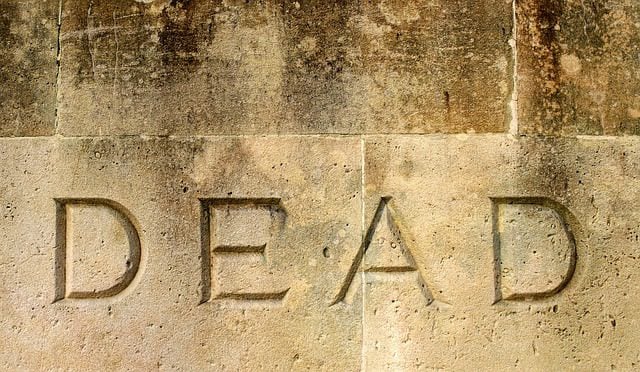
One hundred thousand people are dead.
It happened just in the past hour– we went from ninety-nine thousand and something to 100,0021 confirmed deaths from COVID 19 since February. It will be more by the time I hit “publish,” more still by the time you read this, and even more tomorrow.
One hundred thousand people suffocated from a brand new virus in the last three months, give or take.
Many of the people who died were old. I used to see a meme circulating on social media, that says that whenever an old person dies, a library burns to the ground. I don’t know who was the original author of that sentiment. The elderly, our parents and grandparents, are supposed to be revered. They are our culture’s store of wisdom. They are the ones we’re supposed to look to to explain to us where we came from, so that we can go forward to wherever we’re going. And these didn’t get to die peacefully in the arms of their families. They didn’t get to die in their sleep at their homes one night when no one expected it. They didn’t get to die one evening after laughing and enjoying themselves at a birthday party, or dancing too much at a granddaughter’s wedding, or coming back from that last vacation to see the beach one more time. They died in hospitals and nursing homes, painfully, alone.
I keep seeing people say we need to let the elderly “take care of themselves” so that we can go on living as we wish.
I keep seeing people saying that they all would have died pretty soon anyway, as if all deaths are the same.
Many of the people who died were disabled or chronically ill. They were accustomed to painful lives. Some of them might have even wanted to die, but most didn’t– believe it or not, we who live with disability or chronic illness find joy in our lives. We have difficulty, but we also have happiness right where we are. We have family and friends who don’t see us as burdens. We have jobs. We have hobbies and activities we find satisfying. We have wisdom we’d like to share. Our lives are worth living and we like them.
Those disabled people didn’t get to die the deaths they might have expected. They didn’t get to be in their homes or with their usual doctor who understands their condition and knows what to do for pain. They didn’t get to die with their regular caregivers present to help the ICU staff know what they were thinking, if they had difficulty communicating in a more typical way. They died alone, scared, suffering.
One of my friends who lives with a chronic illness as I do expressed her shock at the barrage of people saying “no one can live in isolation like this. We have to get back to normal! The disabled can self-isolate.” That amounts to saying “no one can live like this but we expect the disabled to do so anyway.” And if a normal person having to self-isolate a little longer could help disabled people be safe and not have to self-isolate for so long, that’s too much of a burden to bear. As if the disabled aren’t people at all.
We’ve often suspected you view us that way. But that doesn’t mean it doesn’t hurt to hear you say it.
Some of the people who died were children. Children, for the most part, seem blessedly immune to the worst symptoms of COVID, but some aren’t. A newborn baby died here, a five-year-old there. Their families were crushed.
Some of the people who died were healthy adults, and no one’s sure how it happened.
A lot of the people who died were people of color. And it’s certainly funny how the moment it was pointed out that people of color were dying at a much higher rate than whites, was the exact moment a loud chorus of people decided that self-isolating wasn’t worth it and we had to find ways to get back to work.
A hundred thousand people died, in the United States of America, of a brand new illness we don’t have a vaccine for or a way to treat.
That illness is still among us. It’s highly contagious. We’re still losing hundreds every day. We are warned of a second wave, of a hundred thousand more deaths, maybe three thousand people dying a day, if we’re not very careful in how we resume our jobs and our social lives. A 9/11 a day, if we don’t take reasonable precautions.
Do you remember the horror of 9/11? A lot of people on social media have been pointing this out. Do you remember how you felt during and after the 9/11 terrorist attacks? Do you remember how the whole world stood still after three thousand people were murdered in a single day? We plastered photos of the dead on walls.There was nothing on television but news of the deaths. We cried for days. We changed our whole way of life and we never went back to normal.
A hundred thousand people died traumatic, painful deaths in the past three months. Over thirty 9/11 terrorist attacks in just over 90 days.
Their families are in mourning but they can’t get together to comfort each other because it’s still too dangerous. They are mourning alone.
Meanwhile, I have seen people parading with signs that say “I need a haircut.”
I have seen people demanding to go to restaurants and watch sports.
I have seen women complaining in public that while they finally got to go to the salon for a pedicure, they were offended that their pedicurist was wearing a mask and wanted her to take it off.
I have heard of people harassing, assaulting and even killing people who remind them to take precautions with masking and social distancing.
I have seen so much talk about money and boredom and getting back to normal.
A hundred thousand people are dead.
By the time you read this, it will be more.
Blessed repose and eternal memory.
That’s something that ought to matter to us.
I don’t understand what our culture has become.
Image via Pixabay
Mary Pezzulo is the author of Meditations on the Way of the Cross.
Steel Magnificat operates almost entirely on tips. To tip the author, visit our donate page.













